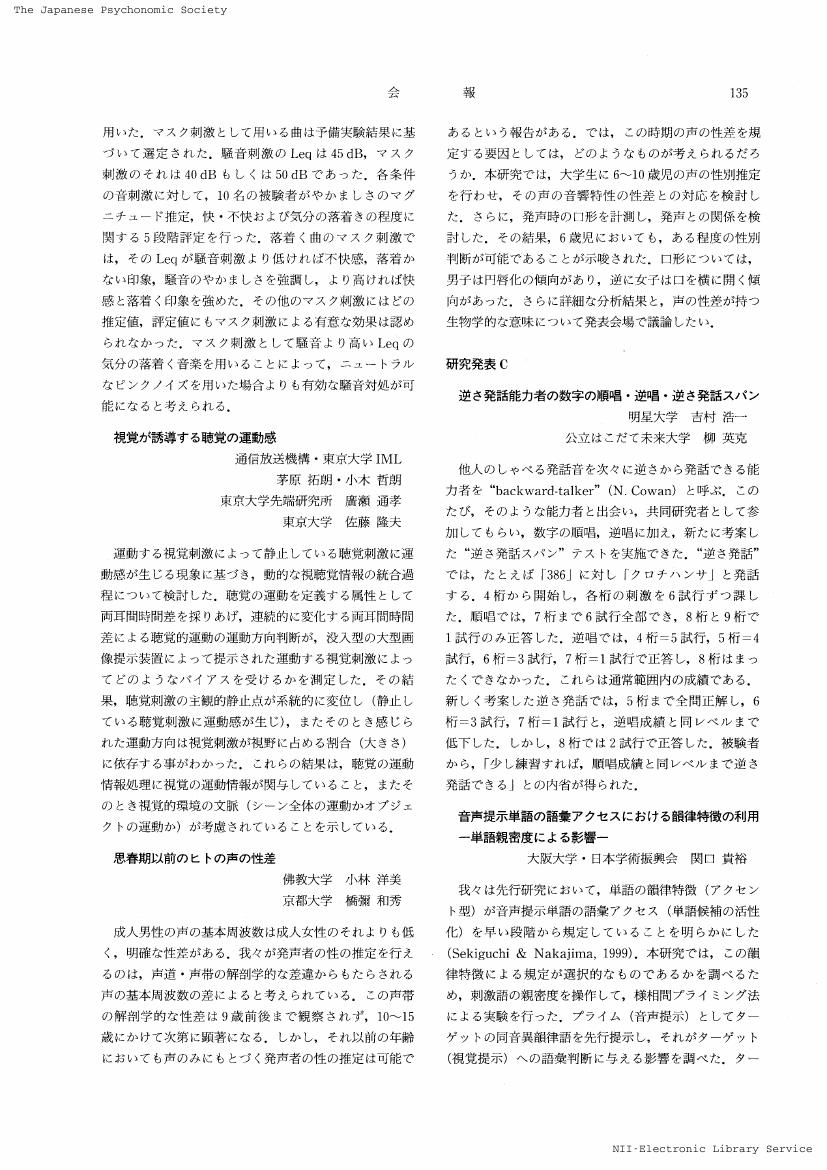69 0 0 0 OA マインドフルネス・トレーニングは実行機能の何を変えるのか ―田中・杉浦論文へのコメント―
- 著者
- 関口 貴裕
- 出版者
- 心理学評論刊行会
- 雑誌
- 心理学評論 (ISSN:03861058)
- 巻号頁・発行日
- vol.58, no.1, pp.153-159, 2015 (Released:2018-06-19)
- 被引用文献数
- 4
2 0 0 0 OA 顔記憶の個人差と顔に対する記銘時の注視パタン
- 著者
- 関口 貴裕 大東 玲子
- 出版者
- 日本認知心理学会
- 雑誌
- 日本認知心理学会発表論文集 日本認知心理学会第5回大会
- 巻号頁・発行日
- pp.156, 2007 (Released:2007-10-01)
顔記憶の個人差と,顔に対する記銘時の注視パタンの関係を眼球運動計測により検討した。実験参加者45名に,液晶ディスプレィ上に提示された未知の人物20名(動画)の印象判断を行わせ(偶発記憶課題),その際の注視パタンを記録した。そして8分間の挿入課題の後,写真刺激を用いて先ほど見た顔に対する再認記憶課題を実施した。顔記銘時の注視パタンを再認記憶成績高群,低群で比較したところ,両群ともに眼,鼻,口の内部特徴を,頬,額,輪郭,髪の外部特徴に比べ長く注視していたが,内部特徴に対する注視時間は高群の方が低群よりも長く,外部特徴に対する注視時間は低群の方が高群よりも長くなっていた。この結果から,顔の内部特徴を長く注視することが顔記憶に促進的であり,顔を見た場合にどの領域をより長く注視するかの違いが顔記憶の個人差に関わることが示唆された。
1 0 0 0 歩きスマホ時の空間的注意範囲の自己評価は正確か?
- 著者
- 関口 貴裕 加藤 駿
- 出版者
- 日本認知心理学会
- 雑誌
- 日本認知心理学会発表論文集
- 巻号頁・発行日
- vol.2016, 2016
スマートフォンを見ながら歩く際(歩きスマホ)に注意が前方の地面のどの範囲(奥行き距離)まで及ぶかに関する人々の認識の正確さを検討した。そのためにまず50名の参加者に,歩きスマホをしながら床面のLED光に気づくと思う最短の距離を,その場に立つことで報告させた。そして,20 mの直線歩行を歩きスマホをしながら繰り返す中で,途中7カ所設置されたLEDの1つをランダムに点灯し,それへの気づきが得られた距離を実際の空間的注意範囲を示す値として測定した。注意範囲の自己評価の広さにより参加者を狭群,中群,広群に分け,実際の注意範囲とのズレを群間で比較したところ,狭群,中群のズレがそれぞれ平均3.0 cm,5.1 cmと小さかったのに対し,広群では自己評価値の方が実際より平均61.1 cm広くなっていた。この結果は,歩きスマホ中の注意範囲を過大評価する傾向の人が3分の1程度いることを示唆している。
- 著者
- 関口 貴裕
- 出版者
- 日本基礎心理学会
- 雑誌
- 基礎心理学研究 (ISSN:02877651)
- 巻号頁・発行日
- vol.19, no.2, pp.135-136, 2001-03-31 (Released:2016-11-17)
1 0 0 0 無意図的に想起された自伝的記憶の感情価に関する実験的検討
- 著者
- 雨宮 有里 関口 貴裕
- 出版者
- 公益社団法人 日本心理学会
- 雑誌
- 心理学研究 (ISSN:00215236)
- 巻号頁・発行日
- vol.77, no.4, pp.351-359, 2006
- 被引用文献数
- 3
Involuntary recollection of autobiographical memories refers to memories of personal experiences that pop into consciousness with no preceding attempts at remembering. In a laboratory experiment, we examined the effect of emotional valence on the involuntary recollection of autobiographical memories. Participants evaluated the familiarity of four words referring to various events (cues for autobiographical recollection) and then reported whether they had unintentionally recalled past experiences during these evaluations. We manipulated the emotional valence (positive/negative) and specificity (specific/common) of the cue words. In the specific-event condition, cue words for positive events elicited more involuntary memories than those for negative events. In addition, the mean frequency of recollection was higher in the specific-event condition than that in the common-event condition. These results are consistent with studies that used diary methods, which showed a dominance of positive events in involuntary recollection of autobiographical memories.
1 0 0 0 OA 無意図的に想起された自伝的記憶の感情価に関する実験的検討
- 著者
- 雨宮 有里 関口 貴裕
- 出版者
- 公益社団法人 日本心理学会
- 雑誌
- 心理学研究 (ISSN:00215236)
- 巻号頁・発行日
- vol.77, no.4, pp.351-359, 2006-10-25 (Released:2010-07-16)
- 参考文献数
- 18
- 被引用文献数
- 2 3
Involuntary recollection of autobiographical memories refers to memories of personal experiences that pop into consciousness with no preceding attempts at remembering. In a laboratory experiment, we examined the effect of emotional valence on the involuntary recollection of autobiographical memories. Participants evaluated the familiarity of four words referring to various events (cues for autobiographical recollection) and then reported whether they had unintentionally recalled past experiences during these evaluations. We manipulated the emotional valence (positive/negative) and specificity (specific/common) of the cue words. In the specific-event condition, cue words for positive events elicited more involuntary memories than those for negative events. In addition, the mean frequency of recollection was higher in the specific-event condition than that in the common-event condition. These results are consistent with studies that used diary methods, which showed a dominance of positive events in involuntary recollection of autobiographical memories.
- 著者
- 関口 貴裕 立脇 洋介
- 出版者
- 東京学芸大学
- 雑誌
- 東京学芸大学紀要. 総合教育科学系 (ISSN:18804306)
- 巻号頁・発行日
- vol.63, no.1, pp.203-211, 2012-02-29
1 0 0 0 OA 意図的および無意図的に想起された自伝的記憶の特定性の比較
- 著者
- 雨宮 有里 高 史明 関口 貴裕
- 出版者
- 公益社団法人 日本心理学会
- 雑誌
- 心理学研究 (ISSN:00215236)
- 巻号頁・発行日
- vol.82, no.3, pp.270-276, 2011 (Released:2012-01-12)
- 参考文献数
- 14
- 被引用文献数
- 1
This paper compared the specificity of recollections of autobiographical memories where musical cues for events were varied. We used music which was popular in the past as cues which were related to a larger number of past individual events (frequent events cues) and music which was typically only sung at graduation ceremonies as cues which were related to a smaller number of events (rare events cues). In the instructed retrieval condition, participants were told to listen to the music and to recall past events, whereas in incidental retrieval condition, the instruction was only to listen to the music. Then participants were asked to describe what they recalled while hearing the music. When frequent events musical cues were played, the specificities of the recalled events were higher in the instructed retrieval condition than in the incidental retrieval condition. In contrast, when rare events musical cues were played, there were no differences in the specificities of the recalled events.

